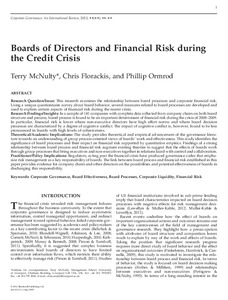Boards of directors and financial risk during the credit crisis

McNulty, Terry ; Florackis, Chris ; Ormrod, Phillip
2013
21
58-78
economic recession ; financial sector ; corporate governance ; board level employee representation
Workers participation and European works councils
English
Bibliogr.
"Research Question/Issue
This research examines the relationship between board processes and corporate financial risk. Using a unique questionnaire survey about board behavior, several measures related to board processes are developed and used to explain certain aspects of financial risk during the recent crisis.
Research Findings/Insights
In a sample of 141 companies with complete data collected from company chairs on both board structure and process, board process is found to be an important determinant of financial risk during the crisis of 2008–2009. In particular, financial risk is lower where non-executive directors have high effort norms and where board decision processes are characterized by a degree of cognitive conflict. The impact of cognitive conflict is, however, found to be less pronounced in boards with high levels of cohesiveness.
Theoretical/Academic Implications
The study provides theoretical and empirical advancement of the governance literature towards an understanding of group process-oriented views of boards' work and effectiveness. This study identifies the significance of board processes and their impact on financial risk supported by quantitative empirics. Findings of a strong relationship between board process and financial risk augment existing theories to suggest that the effects of boards work through group processes that bring executives and non-executives together in relations laced with control and collaboration.
Practitioner/Policy Implications
Regulators, acting post the financial crisis have produced governance codes that emphasize risk management as a key responsibility of boards. The link between board process and financial risk established in this paper provides evidence for company chairs and other directors on the possibilities and potential effectiveness of boards in discharging this responsibility."
Digital
The ETUI is co-funded by the European Union. Views and opinions expressed are however those of the author(s) only and do not necessarily reflect those of the European Union or the ETUI.